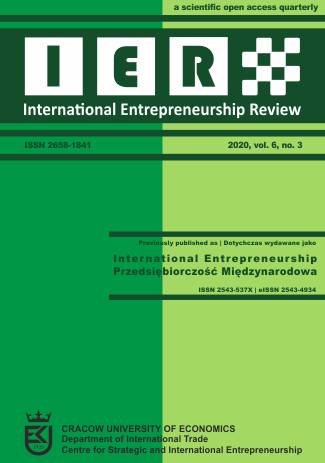IT outsourcing as a factor for innovation development in small and medium-sized enterprises

Abstract
Objective: The aim of the article is to present the innovative face of IT outsourcing based on a survey. The article shows how it influences the creation of various types of innovation. The article tries to determine whether IT outsourcing affects the stimulation of innovation in the area of small and medium-sized enterprises in the Silesian Voivodeship.
Research Design & Methods: Primary information was collected using the survey technique and the questionnaire interview. The main research technique was the postal questionnaire. The obtained empirical data were analysed using selected statistical methods (χ2 independence test).
Findings: Firms should be made aware of the advantages of outsourcing partnership in the field of IT in terms of creating innovation. A good practice in this respect would be to create a zone of redistribution of experience in implementing IT innovations.
Contribution & Value Added: The subject of the impact of IT outsourcing on the creation of innovation has not been widely discussed in the subject literature so far. This article attempts to fill that gap.
Keywords
IT outsourcing, innovation, cooperation, outsourcing partners, small and medium-sized enterprises (SMEs), business
Author Biography
Maria Kocot
Assistant professor at the University of Economics in Katowice (Poland) at the Department of Economic Informatics. PhD in economics (2009), Master of economics (2004). She is the author of scientific articles in the field of management and economics.
Damian Kocot
Assistant professor at the University of Economics in Katowice (Poland) at the Department of Economic Informatics. PhD in management (2011). He is the author of scientific articles in the field of management and economics.
References
- Aalders, R. (2001). The IT outsourcing guide. New Jersey: John Wiley & Sons Ltd.
- Aarikka-Stenroos, L., Sandberg, B., & Lehtimäki, T. (2014). Networks for the commercialization of innovations: A review of how divergent network actors contribute. Industrial Marketing Man-agement, 10 (3), 365-381.
- Cho, H.J., & Pucik, V. (2005). Relationship between Innovativeness, Quality, Growth. Profitability, and Market Value. Strategic Management Journal, 60 (26), 556.
- Danneels, E., & Kleinschmidt, E.J. (2016). Product Innovativeness from the Firm`s Perspective: Its Dimensions and their Impact on Project Selection and Performance. Institute for the Study of Business Markets, The Pennsylvania State University.
- Dewick, P., & Miozzo, M. (2004). Networks and innovation: sustainable technologies in Scottish social housing. R&D Management, 54 (3), 323-333.
- Hakanson, H., & Snehota, I. (2006). No Business is an island: The network concept of business strategy. Scandinavian Journal of Management, 10 (3), 256-270.
- Hilami, M.F., Ramayah, T., Mustapha, Y., & Pawanchik, S. (2010). Product and Process Innovative-ness: Evidence from Malaysian SMEs. European Journal of Social Science, 60 (16), 557.
- Hindle, T. (1998). Pocet Strategy. The Economist Newspaper Ltd in association with Profile Book.
- Kern, T., Kern, T., Willcocks, L., & Van Heck, E. (2002). The winner`s curse in IT outsourcing: strate-gies for avoiding relational trauma. California Management Review, 44 (2), 149-150.
- Kim, Y., & Lui, S. (2015). The impacts of external network and business group on innovation: Do the types of innovation matter? Journal of Business Research, 44 (9), 1964-1973.
- Klimas, P. (2014). Sieci innowacji. Implikacja bliskości organizacyjnej. Katowice: Wydawnictwo Uniwersytetu Ekonomicznego w Katowicach.
- Klincewicz, K. (2014). Tworzenie innowacji przez współpracę międzyorganizacyjną. In A.K. Koźmiń-ski, & D. Latusek-Jurczak (Eds.), Relacje międzyorganizacyjne w naukach o zarządzaniu (pp. 257-258). Warszawa: Wolters Kluwer Business.
- Kłos, M. (2009). Outsourcing w polskich przedsiębiorstwach. Warszawa: CeDeWu.
- Kodama, M. (2007). Innovation and knowledge creation through leadership-based strategic com-munity: Case study on high-tech company in Japan. Technovation, 40 (3), 115-132.
- Lacity, M.C., & Hirschheim, R. (1993). Information Systems Outsourcing – Myths, Metaphors and Realities. New Jersey: John Wiley & Sons Ltd.
- Luecke, R., Katz, R. (2005). Zarządzanie kreatywnością i innowacją. Warszawa: MT Biznes.
- Niedzielski, P. (2005). Innowacyjność. In K.B. Matusiak (Ed.), Innowacje i transfer technologii. Słownik pojęć (pp. 119-120). Warszawa: Polska Agencja Rozwoju Przedsiębiorczości.
- Nowacki R. (2010). Innowacyjność w zarządzaniu a konkurencyjność przedsiębiorstwa. Warszawa: Difin.
- Partanen, J., Chetty, S.K., & Rajala, A. (2014). Innovation types and network relationships. Entre-preneurship Theory & Practice, 30 (5), 1027-1055.
- Pichlak, M. (2012). Uwarunkowania innowacyjności organizacji. Studium teoretyczne i wyniki ba-dań. Warszawa: Difin.
- Sankowska, A. (2009). Organizacja wirtualna: koncepcja i jej wpływ na innowacyjność. Warszawa: Wydawnictwa Akademickie i Profesjonalne.
- Sobińska, A., & Jakubowska, W. (2013). Zasoby a konkurencyjność i wyniki przedsiębiorstwa – przgląd wybranych badań. In R. Bartkowiak, & P. Wachowiak (Eds.), Wiedza i bogactwo narodów. Kapitał ludzki, globalizacja i regulacja w skali światowej (pp. 21-24). Warszawa: Oficyna Wydawnicza Szkoły Głównej Handlowej.
- Sobińska, M. (2008). Zarządzanie outsourcingiem informatycznym. Wrocław: Wydawnictwo Aka-demii Ekonomicznej we Wrocławiu.
- Szymaniak, A. (2008). Globalizacja usług – Outsourcing, Offshoring i Shares Services Centres. War-szawa: Wydawnictwa Akademickie i Profesjonalne.
- Zakrzewska-Bielawska, A. (2016). Potencjał relacyjny a innowacyjność przedsiębiorstwa – w kierunku open innovation. Management Forum, 12 (1), 6-8.
